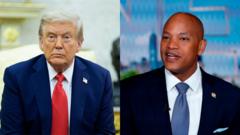This week, a controversial ban on wigs, hair extensions, and skin-lightening products at Senegal's historic Grand Théâtre de Dakar stirred significant public outcry, reflecting deeper societal tensions surrounding identity and gender politics in the country. The internal directive from Serigne Fall Guèye, the theatre's director and appointed by the national culture ministry, aimed to "promote Pan-African values" and enhance the cultural image of the institution. However, critics quickly condemned the ban as a thinly veiled attempt to control women's choices and bodies under the pretext of cultural pride.
Feminist groups and various civil society leaders voiced concerns that the memo highlighted ongoing gender inequality in Senegal, particularly as the current administration boasts only four women in a cabinet of 25 and has eliminated the Ministry of Women. The backlash was swift on social media, drawing accusations of sexism and invasive paternalism against Guèye's directive.
The controversy was intensified by Guèye's political history with the ruling Pastef party, known for espousing anti-colonial, pan-Africanist ideologies. Critics expressed unease that his personal political agenda may be influencing a public institution that should maintain neutrality. Political analyst Fatoumata Ba critically pointed out that the real issue extends beyond hairstyles to broader power dynamics that aim to dictate identity and suppress those who do not comply.
In a notable and widely circulated response, feminist analyst Henriette Niang Kandé questioned the logic behind the ban, asking whether one would consider similar restrictions on men's grooming choices, such as shaving heads or wearing false collars. Despite the minority who supported the ban, emphasizing cultural pride, Guèye defended the memo as part of a mission to reclaim African dignity within the arts, asserting that the influx of Eurocentric beauty standards had tarnished that image.
Critics, however, contend that these policies oversimplify cultural pride by equating it primarily with physical appearance while neglecting more profound systemic issues. As sociologist Mame Diarra Thiam articulated, authentic cultural affirmation should start with addressing language, education, and economic justice—not limiting personal grooming and aesthetic choices.
Facing mounting pressure and public backlash, Guèye withdrew the ban within a day, citing misunderstanding while reiterating the theatre's cultural mission. Nevertheless, the reversal illustrated the growing discontent among the urban youth and progressive sectors who once rallied behind Prime Minister Ousmane Sonko but feel disillusioned by what they perceive as the government's increasingly conservative direction.
Ultimately, the brief episode over wigs and skin-lightening products transcended mere aesthetics, spotlighting who holds the authority to define cultural authenticity and the implications of that power. In a nation where skin-lightening remains prevalent, the discussion taps into issues of post-colonial identity, gender inequality, economic survival, and the quest for personal freedom. While the ban itself has been rescinded, the conversations it ignited continue to resonate.
Feminist groups and various civil society leaders voiced concerns that the memo highlighted ongoing gender inequality in Senegal, particularly as the current administration boasts only four women in a cabinet of 25 and has eliminated the Ministry of Women. The backlash was swift on social media, drawing accusations of sexism and invasive paternalism against Guèye's directive.
The controversy was intensified by Guèye's political history with the ruling Pastef party, known for espousing anti-colonial, pan-Africanist ideologies. Critics expressed unease that his personal political agenda may be influencing a public institution that should maintain neutrality. Political analyst Fatoumata Ba critically pointed out that the real issue extends beyond hairstyles to broader power dynamics that aim to dictate identity and suppress those who do not comply.
In a notable and widely circulated response, feminist analyst Henriette Niang Kandé questioned the logic behind the ban, asking whether one would consider similar restrictions on men's grooming choices, such as shaving heads or wearing false collars. Despite the minority who supported the ban, emphasizing cultural pride, Guèye defended the memo as part of a mission to reclaim African dignity within the arts, asserting that the influx of Eurocentric beauty standards had tarnished that image.
Critics, however, contend that these policies oversimplify cultural pride by equating it primarily with physical appearance while neglecting more profound systemic issues. As sociologist Mame Diarra Thiam articulated, authentic cultural affirmation should start with addressing language, education, and economic justice—not limiting personal grooming and aesthetic choices.
Facing mounting pressure and public backlash, Guèye withdrew the ban within a day, citing misunderstanding while reiterating the theatre's cultural mission. Nevertheless, the reversal illustrated the growing discontent among the urban youth and progressive sectors who once rallied behind Prime Minister Ousmane Sonko but feel disillusioned by what they perceive as the government's increasingly conservative direction.
Ultimately, the brief episode over wigs and skin-lightening products transcended mere aesthetics, spotlighting who holds the authority to define cultural authenticity and the implications of that power. In a nation where skin-lightening remains prevalent, the discussion taps into issues of post-colonial identity, gender inequality, economic survival, and the quest for personal freedom. While the ban itself has been rescinded, the conversations it ignited continue to resonate.



















